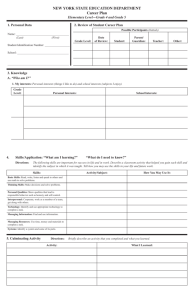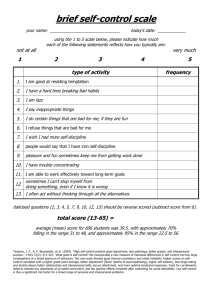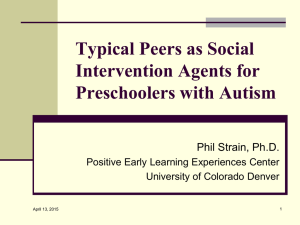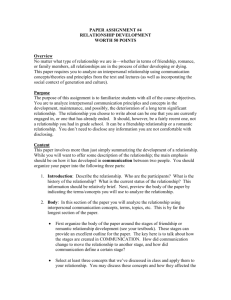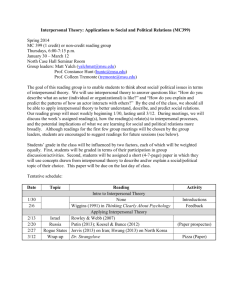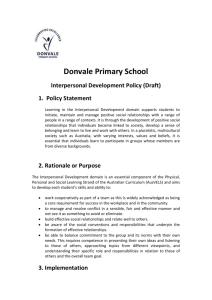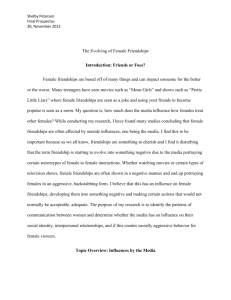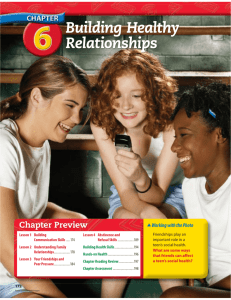Interpersonal Relationships
advertisement
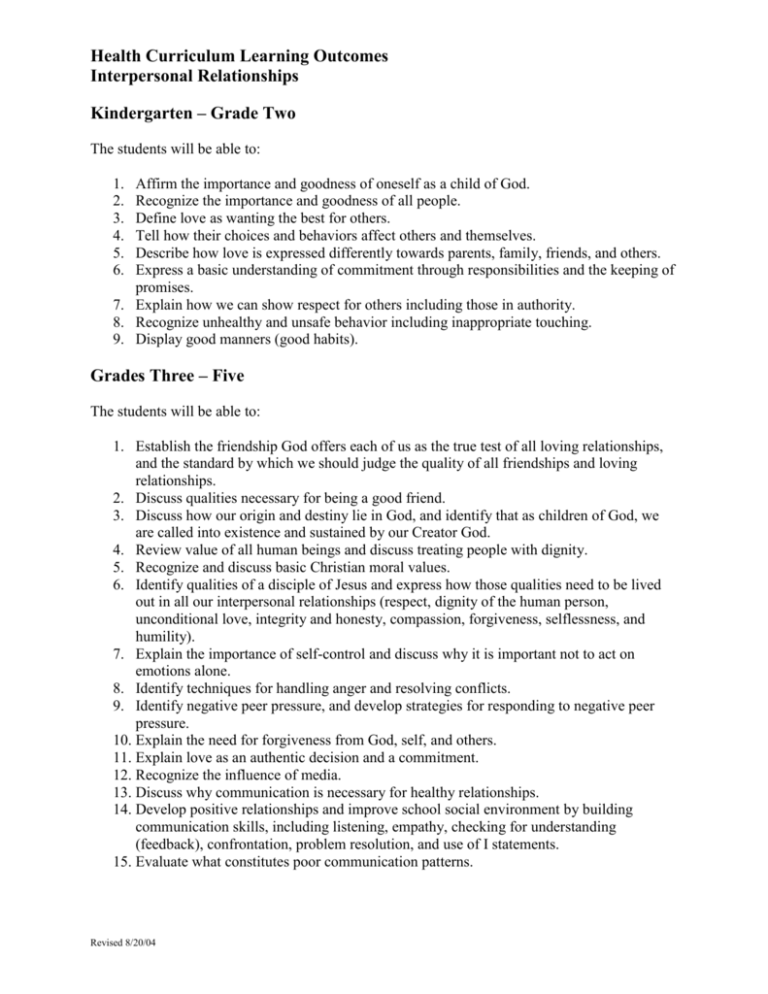
Health Curriculum Learning Outcomes Interpersonal Relationships Kindergarten – Grade Two The students will be able to: 1. 2. 3. 4. 5. 6. Affirm the importance and goodness of oneself as a child of God. Recognize the importance and goodness of all people. Define love as wanting the best for others. Tell how their choices and behaviors affect others and themselves. Describe how love is expressed differently towards parents, family, friends, and others. Express a basic understanding of commitment through responsibilities and the keeping of promises. 7. Explain how we can show respect for others including those in authority. 8. Recognize unhealthy and unsafe behavior including inappropriate touching. 9. Display good manners (good habits). Grades Three – Five The students will be able to: 1. Establish the friendship God offers each of us as the true test of all loving relationships, and the standard by which we should judge the quality of all friendships and loving relationships. 2. Discuss qualities necessary for being a good friend. 3. Discuss how our origin and destiny lie in God, and identify that as children of God, we are called into existence and sustained by our Creator God. 4. Review value of all human beings and discuss treating people with dignity. 5. Recognize and discuss basic Christian moral values. 6. Identify qualities of a disciple of Jesus and express how those qualities need to be lived out in all our interpersonal relationships (respect, dignity of the human person, unconditional love, integrity and honesty, compassion, forgiveness, selflessness, and humility). 7. Explain the importance of self-control and discuss why it is important not to act on emotions alone. 8. Identify techniques for handling anger and resolving conflicts. 9. Identify negative peer pressure, and develop strategies for responding to negative peer pressure. 10. Explain the need for forgiveness from God, self, and others. 11. Explain love as an authentic decision and a commitment. 12. Recognize the influence of media. 13. Discuss why communication is necessary for healthy relationships. 14. Develop positive relationships and improve school social environment by building communication skills, including listening, empathy, checking for understanding (feedback), confrontation, problem resolution, and use of I statements. 15. Evaluate what constitutes poor communication patterns. Revised 8/20/04 Health Curriculum Learning Outcomes Interpersonal Relationships Grades Six – Eight The students will be able to: 1. Review and discuss fully their own value and dignity given to them and all people by God. 2. Discuss how self-love is a foundation of healthy relationships. 3. Understand we all make mistakes, can change behaviors, as well as receive and give forgiveness. 4. Discuss the positive and negative consequences of our choices. 5. Define maturity. 6. Describe the qualities of good friendships and how they are the basis for all interpersonal relationships including dating. 7. Know how to recognize various forms of abuse, and how to respond properly to instances of abuse. 8. Understand that love is a decision and describe the difference between a crush, an infatuation, and love in various types of interpersonal relationships. 9. Identify how risk behaviors, such as drugs and alcohol, affect decision-making and relationships. 10. Describe positive interpersonal communication skills. 11. Discuss how peer pressure influences behaviors and choices and include strategies for setting personal boundaries, and recognizing and learning positive responses to peer pressure. 12. Recognize the detrimental effect of prejudice and stereotypes on individuals, relationships, and society in general. 13. State how the goals we set for ourselves will impact self and others. Grades Nine – Twelve The students will be able to: 1. Express and review a deep understanding of the true love of God, self and others. 2. List and recognize virtues, moral truths, and behavior that contribute to the development of personal integrity. 3. Assess positive and negative outcomes of actions and consider the consequences for all. 4. Describe the role of a responsible disciple in Church and community. 5. List signs of maturity as the ability to delay gratification; othercenteredness; responsible decision-making; the ability to accept consequences for one’s choices; and the courage to do what is right. 6. Express the need for morals and good character in self and in others. 7. Discuss and recognize the influence of media. 8. Learn techniques for self-control, anger-management, and conflict resolution within families, among friends, and in other relationships. 9. Describe how one can respectfully agree to disagree while remaining true to one’s convictions. Revised 8/20/04 Health Curriculum Learning Outcomes Interpersonal Relationships 10. Contrast the emotional impact on relationships of positive communication (active listening, praise, humor) with negative communication (teasing, peer pressure, bullying). 11. Explain the importance of setting limits in healthy relationships. 12. Discuss how chastity can strengthen self-respect, self-control, and love of others. 13. Describe how peers and friends can support one another in one’s choice to be abstinent until marriage. 14. Recognize and identify the concept of friendships without romantic involvement, how friendships may develop into romantic relationships, and the difference between love and infatuation. 15. Describe commitment in casual and serious relationships, and how men and women may view them differently. Revised 8/20/04
